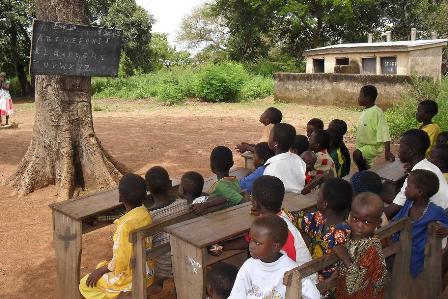

The Educate Africa Institute (EAI) is worried about the number of schools operating under trees because it is against their educational rights.
In Ghana, education is a fundamental right for every child. However, the harsh reality persists: over 5,403 schools operate under trees, depriving children of a conducive learning environment. Break down of the total schools under trees: 2,302 kindergarten, 2,403 primary, and 698-JHS across the country. This stark reality blatantly violates their basic human rights. In light of this, human rights advocates in Ghana must unite and strategically engage with education think tanks to petition the government to prioritize the construction of modern classrooms for these learners.
The Urgency of the Issue:
The existence of thousands of schools under trees in Ghana is not merely an infrastructure problem; it’s a grave violation of children’s rights. Learning under such conditions jeopardizes their safety, health, and overall educational outcomes. These children are denied the basic amenities necessary for a quality education, hindering their potential and perpetuating cycles of poverty and inequality.
The Role of Human Rights Advocates:
Human rights advocates play a crucial role in championing the rights of the vulnerable and marginalized. By advocating for the construction of modern classrooms, they can ensure that every child in Ghana has access to a safe and conducive learning environment. Fighting the Ga Gborbu Wulomo’s traditional right alone doesn’t make you proactive. Those traditional and cultural practices performed by the 16-year-old girl were far from human rights abuses.
Moreover, human rights advocates can raise awareness about the detrimental effects of studying under trees and garner support from the public and policymakers.
Why Collaborate with Education Think Tanks?
Education think tanks possess valuable expertise and insights into educational policies and practices. By joining forces with these organizations, human rights advocates can strengthen their advocacy efforts and develop evidence-based strategies to address the issue of schools under trees. Education think tanks can provide research, data analysis, and policy recommendations to support the advocacy campaign, enhancing its effectiveness and impact.
Petitioning Government:
Armed with research, data, and public support, human rights advocates, alongside education, and think tanks, should petition the government to prioritize the construction of modern classrooms for schools under trees. They can present compelling arguments highlighting the urgent need for action and propose feasible solutions to address the infrastructure gap. Additionally, they can advocate for increased investment in education to ensure that all children have access to quality learning environments.
Mobilizing Support:
Building a coalition of stakeholders is essential for a successful advocacy campaign. Human rights advocates can collaborate with civil society organizations, teachers’ unions, community leaders, and international partners to amplify their voices and exert pressure on the government to act. Through grassroots mobilization, awareness-raising events, and media outreach, they can mobilize support for their cause and galvanize public demand for change.
The plight of thousands of children studying under trees in Ghana is a stark reminder of the ongoing challenges in ensuring universal access to quality education. As human rights advocates, it is our moral imperative to stand up for the rights of these children and demand immediate action from the government. By joining forces with education think tanks and mobilizing support from diverse stakeholders, we can bring about tangible change and create a brighter future for the next generation of Ghanaian learners.
Signed
William Boadi
Executive Director of Educate Africa Institute (EAI), Educationist, and Political analyst, and Social Worker.
+233541935106.
EAI: Promoting Quality Education, and Ensuring Social Justice.






